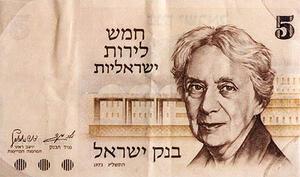Best known as the founder of Hadassah, Henrietta Szold was a dedicated and influential community leader, as well as an essayist, translator, and editor. Raised by her immigrant parents to be deeply committed to the Jewish people and the world of Jewish tradition and scholarship, she became one of the few women of her generation to play a foundational role in creating a meaningful American Jewish culture.
Szold began her community influence as an educator, teaching at her congregation's religious school as a teenager, and after high school graduation, at a local private school. In addition to her home and school responsibilities, Szold began contributing a regular column to the Jewish Messenger. Szold's observations and critique of American Jewish culture garnered attention among American Judaism's intellectual leaders; she became the only woman elected to the publication committee of the newly formed Jewish Publication Society in 1888 and was one of only two women invited to speak at the Jewish Congress held at Chicago's 1893 Columbian Exposition.
Beginning in the late 1870s, Szold worked with Jewish immigrants from Eastern Europe and Russia—an experience that transformed her into a Zionist. From the Russian intellectuals she met, she absorbed the nationalist dream of creating a Jewish community in Palestine. In 1893, Szold joined Baltimore's new Zionist Association, and in 1896, a month before Theodore Herzl's first Zionist writing appeared, she published a lecture outlining her Zionist views. In 1898, she joined the executive committee of the new Federation of American Zionists.
In 1902, Szold moved to New York to study at the Jewish Theological Seminary (JTS), where she was allowed the status of special student based on her assurance that she would not seek rabbinic ordination. At JTS, Szold joined a community of individuals focused, like her, upon creating meaningful spiritual and intellectual resources for American Jews. In New York, Szold also participated in one of several women's Zionist study circles.
In 1909, Szold and her mother traveled to Palestine, where they were appalled by widespread poverty and disease. Back in New York, Szold immersed herself more deeply in Zionist activities. Convinced of American Jewish women's potential to help create a Jewish homeland, she turned to the Zionist study groups. In 1912, 38 women created a women's Zionist organization devoted to promoting Jewish institutions in Palestine and fostering Jewish ideals. Szold was elected president.
Szold was instrumental in shaping the new women's organization, formally named Hadassah in 1914. Under her leadership, Hadassah became the largest American Zionist organization and created the infrastructure for a modern medical system in Palestine that would serve both Jews and Arabs. Szold spent much of her last 25 years in Palestine, overseeing educational, health, and social service institutions that became an integral part of the State of Israel. Although she often felt slighted by the male Zionist leadership, she was elected to influential roles within Palestine's Jewish community and international Zionism.
Szold applied her determined sense of purpose to her personal life as well as to her work in the public sphere. Upon her mother's death in 1916, Szold insisted on saying Kaddish, despite the traditional view that only sons can fulfill this duty. Supreme Court Justice Ruth Bader Ginsburg cites Szold's letter to Haym Peretz on saying Kaddish for her mother as source of personal inspiration: "Szold's plea for celebration of our common heritage while tolerating, indeed appreciating, the differences among us concerning religious practice is captivating. I recall her words even to this day when a colleague's position betrays a certain lack of understanding."
In her 70s, Szold directed Youth Aliyah, an organization that resettled 11,000 children from nations under the Nazi shadow came in Palestine. Her intense commitment to the children of Youth Aliyah gained the childless Szold recognition, throughout Palestine and the Jewish world, as a true mother in Israel. When she died in 1945, thousands attended her funeral, and a boy from one of the last Youth Aliyah transports said Kaddish.
In an interview conducted when she was 75 years old, Szold noted that her greatest assets were "a strong constitution, a devotion to duty and a big conscience," together with "a flair for organization" and "a pretty big capacity for righteous indignation." In her life and career, Henrietta Szold posed questions and faced challenges that Jewish women in North America and around the world continue to explore. Szold spent little time fighting for women's rights or pleading women's grievances. Yet in following what seemed, to her, her duty—from rescuing German Jewish youth to saying Kaddish for her mother—she proved the power of women's activism. Henrietta Szold's life and career proved both a model and a catalyst for transforming and redefining possibilities for women in Jewish communal life.



